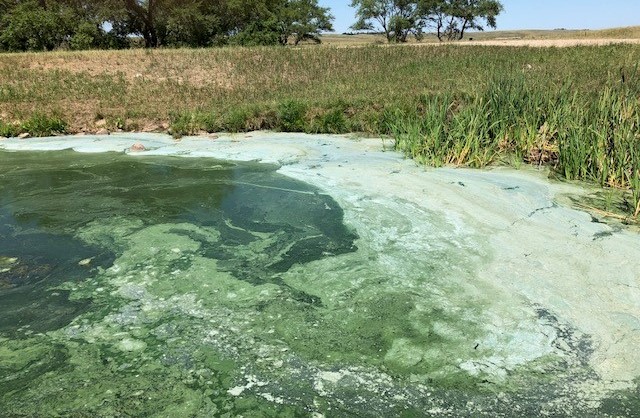
BISMARCK, N.D. (NewsDakota.com) – The City County Health District issued this news release.
“Our partners at North Dakota Department of Environmental Quality have issued a Harmful Algal Bloom Advisory for Lake Ashtabula. The blue-green algae may be harmful to humans and pets. Fish are safe to consume, be sure to rinse thoroughly with tap water before cleaning” states Theresa Will, City-County Health District Administrator. “When in doubt, stay out. You can’t tell for sure if an algal or cyanobacterial bloom is harmful just by looking at it. NDDEQ will continue monitoring the lake every two weeks until the bloom is gone.”
To reduce the risk of illness:
Do not swim, water ski, or tube if the water looks like spilled green paint or pea soup. Avoid swallowing water and watch small children and pets who may ingest water. Rinse off with non-lake water after swimming. Stay away from areas of scum when boating. Rinse hands with non-lake water after landing fish. Rinse fish thoroughly with tap water before cleaning.
Illnesses and symptoms can vary depending on how a person or animal was exposed (came into contact
with algae, cyanobacteria, or their toxins), how long they were exposed, which type of toxin was
present, and how much toxin was present. Symptoms in people can include Stomach pain, vomiting, or diarrhea
Headache, fever, tiredness, or other general symptoms Skin, eye, nose, or throat irritation Neurological symptoms such as muscle weakness or dizziness.
Exposure to some toxins—particularly cyanobacterial toxins—can also harm your liver and kidneys. If
you think you may have symptoms caused by harmful algae, cyanobacteria, or their toxins, contact your
healthcare provider or poison control center.
Animals can get very sick or even die within minutes to days after exposure to harmful algae and
cyanobacteria. Seek veterinary care immediately if your pets or livestock seem sick after going in or near
water. Animals are often the first affected, in part because they are more likely to swim in or drink from
bodies of water that contain harmful algae or cyanobacteria.
Advisory updates for North Dakota lakes are available at www.facebook.com/NDDEQ.
